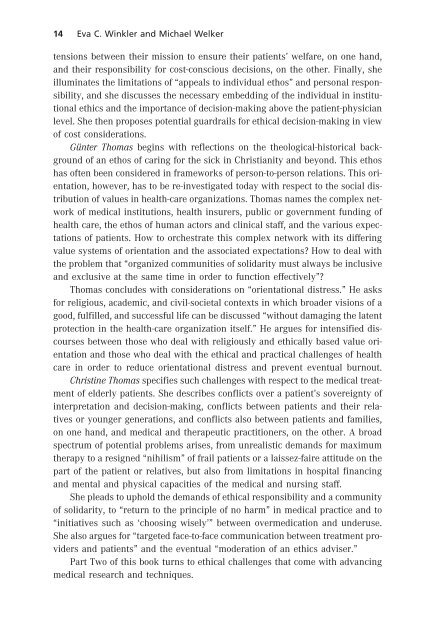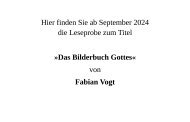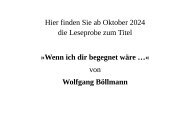Michael Welker | Eva Winkler | John Witte, Jr. | Stephen Pickard (Eds.): The Impact of Health Care (Leseprobe)
Pluralism has become the defining characteristic of many modern societies. Not only a plurality of individual and social claims and activities gain impacts on societal life. A creative pluralism of institutions and their norms profoundly shape our moral commitments and character – notably the family, the market, the media, and systems of law, religion, politics, research, education, health care, and defense. In the theoretical, empirical, and historical contributions to this volume, specialists on medicine, medical ethics, psychology, theology and health care discuss the many challenges that major transformations in their areas of expertise pose to the communication and orientation in late modern pluralistic societies. Contributors come from Germany, the USA and Australia.
Pluralism has become the defining characteristic of many modern societies. Not only a plurality of individual and social claims and activities gain impacts on societal life. A creative pluralism of institutions and their norms profoundly shape our moral commitments and character – notably the family, the market, the media, and systems of law, religion, politics, research, education, health care, and defense.
In the theoretical, empirical, and historical contributions to this volume, specialists on medicine, medical ethics, psychology, theology and health care discuss the many challenges that major transformations in their areas of expertise pose to the communication and orientation in late modern pluralistic societies. Contributors come from Germany, the USA and Australia.
You also want an ePaper? Increase the reach of your titles
YUMPU automatically turns print PDFs into web optimized ePapers that Google loves.
14 <strong>Eva</strong> C. <strong>Winkler</strong> and <strong>Michael</strong> <strong>Welker</strong><br />
tensions between their mission toensure their patients’ welfare, on one hand,<br />
and their responsibility for cost-conscious decisions, on the other. Finally, she<br />
illuminates the limitations <strong>of</strong> “appeals to individual ethos” and personal responsibility,<br />
and she discusses the necessary embedding <strong>of</strong> the individual in institutional<br />
ethics and the importance <strong>of</strong> decision-making above the patient-physician<br />
level. She then proposes potentialguardrails for ethical decision-making in view<br />
<strong>of</strong> cost considerations.<br />
Günter Thomas begins with reflections onthe theological-historical background<br />
<strong>of</strong> an ethos <strong>of</strong>caring for the sick in Christianity and beyond. This ethos<br />
has <strong>of</strong>ten been considered in frameworks <strong>of</strong> person-to-person relations. This orientation,<br />
however, has to be re-investigated today with respect to the social distribution<br />
<strong>of</strong> values in health-care organizations. Thomas names the complexnetwork<br />
<strong>of</strong> medical institutions, health insurers, public or government funding <strong>of</strong><br />
health care, the ethos <strong>of</strong> human actors and clinical staff, and the various expectations<br />
<strong>of</strong> patients. How to orchestrate this complex network with its differing<br />
value systems <strong>of</strong> orientation and the associated expectations? How to deal with<br />
the problem that “organizedcommunities <strong>of</strong> solidarity must always be inclusive<br />
and exclusive at the same time in order to function effectively”?<br />
Thomas concludes with considerations on “orientational distress.” He asks<br />
for religious, academic, and civil-societal contexts in which broader visions <strong>of</strong> a<br />
good, fulfilled, and successful life can be discussed “without damaging the latent<br />
protection in the health-care organization itself.” He argues for intensified discourses<br />
between those who deal with religiously and ethically based value orientation<br />
and those who deal with the ethical and practical challenges <strong>of</strong>health<br />
care in order to reduce orientational distress and prevent eventual burnout.<br />
ChristineThomas specifies such challengeswith respect to the medical treatment<br />
<strong>of</strong> elderly patients. She describes conflicts over apatient’s sovereignty <strong>of</strong><br />
interpretation and decision-making, conflicts between patients and their relatives<br />
or younger generations, and conflicts also between patients and families,<br />
on one hand, and medical and therapeutic practitioners, on the other. Abroad<br />
spectrum <strong>of</strong> potential problems arises, from unrealistic demands for maximum<br />
therapy to aresigned “nihilism” <strong>of</strong> frail patients or alaissez-faire attitude on the<br />
part <strong>of</strong> the patient or relatives, but also from limitations in hospital financing<br />
and mental and physical capacities <strong>of</strong> the medical and nursing staff.<br />
She pleads to uphold the demands <strong>of</strong> ethical responsibility and acommunity<br />
<strong>of</strong> solidarity, to “return to the principle <strong>of</strong> no harm” in medical practice and to<br />
“initiatives such as ‘choosing wisely’” between overmedication and underuse.<br />
She also argues for “targeted face-to-facecommunication between treatment providers<br />
and patients” and the eventual “moderation <strong>of</strong> an ethics adviser.”<br />
Part Two <strong>of</strong> this book turns to ethical challenges that come with advancing<br />
medical research and techniques.
















